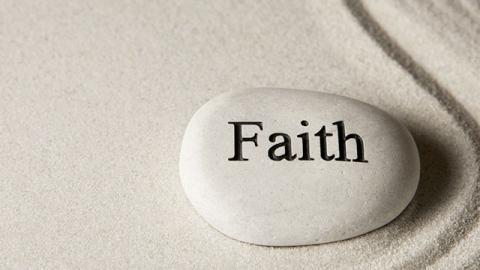
Faith ... in What?
Does your faith seem small? Take heart. Perhaps you just need to redirect it.
Consider Jesus’ statement below:
Then he touched their eyes and said, “Because of your faith, it will happen.” Then their eyes were opened, and they could see! (Matthew 9:29-30 NLT).
The obvious meaning of Jesus’ words is that faith sets the stage for the Lord to help us, and that unbelief keeps us from receiving from him what we need. The blind men in this narrative believed Jesus could heal them—and he did. Conversely, the residents of Nazareth, Jesus’ hometown, did not believe in him—and no great miracles happened there (Mark 6).
What is not so obvious is that both the blind men and the residents of Nazareth believed. The blind men believed Jesus was a prophet who had miracle-working power and Jesus’ hometown acquaintances believed he was a man like them so he couldn’t be a miracle worker.
Do we not all believe something, all of the time? And what we believe, what we really have faith in, greatly impacts our relationship with God and the outcome of our prayers. If I ask God for help, but remain anxious and uncertain, could it mean that I have greater faith in the problem than I do in God? In that case, Jesus’ words “Because of your faith, it will happen” (Matthew 9:29 NLT) seem to imply “Because of your faith that things will continue to be bad, that is what will happen.”
Is that not why the Scriptures urge us to do the kind of thinking that creates a climate for faith in God? For example:
Fix your thoughts on what is true, and honorable, and right, and pure, and lovely, and admirable. Think about things that are excellent and worthy of praise (
NLT).This Book of the Law shall not depart from your mouth, but you shall meditate in it day and night (Joshua 1:8 NKJV).
But they delight in the law of the LORD, meditating on it day and night (Psalm 1:2 NLT).
In the vicinity of Nogales, Arizona, where my family moved when I was in high school, is a butte-like peak referred to as "Monkey Mountain." The front of it is a sheer vertical wall, so climbers have to hike around to the back of it. There, they can step from boulder to boulder, shimmy up crevices, pick their way gingerly along narrow ledges, and, finally, cross the narrow saddle connecting to the summit.
Even after my siblings and I grew up and moved to distant parts of the United States, we looked forward to making this climb when home for a visit. On one of the last such occasions, we parked the car at the Peña Blanca picnic grounds and began the trek toward Monkey Mountain. Although we were only a few hundred yards from the base of the mountain, our progress was slow because of the rocky ground and the trench-like depressions (probably dry arroyos, or stream beds) we had to cross. Amazingly, when down in the lowest part of these troughs, the view of the mountain was completely cut off. If one spent much time down there, one might even forget there was a mountain just a hundred yards away!
Problems always loom large. When we are sunk down in the middle of a challenging situation, these circumstances are all that we can see. God is much greater than our difficulty, but our view of him seems cut off. If we pray in that gloomy frame of mind, is that praying in faith? At such times, we have to purposely remind ourselves that God and his power, his love, and his solutions are still there—right over that pile of rocks.
Since our faith affects what will happen, let’s make a point of setting our expectations on God. Let's not allow ourselves to become trapped by faith in the wrong thing!
Copyright © Celia Milslagle, used with permission.



